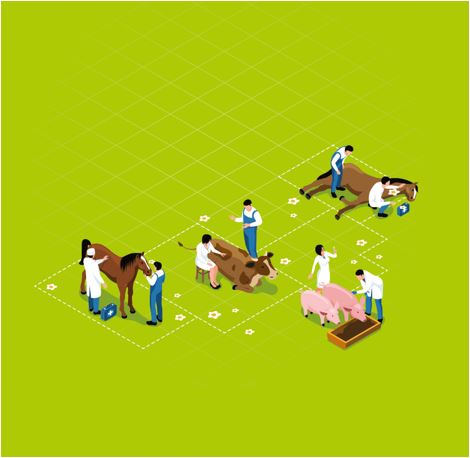Home » Community veterinary pharmacy

I grew up working in my parents’ pharmacy in Mayo. My dad in particular had a keen interest in veterinary pharmacy from having worked in my grandfather’s pharmacy. As a result, I was exposed to the veterinary pharmacy world from a young age. On school holidays I often spent time capping bottles or checking off orders while listening to my dad explain different diseases and treatments to the public for everything from dogs to donkeys, and even ducks!
I was working in Dublin after University to gain experience in other aspects of pharmacy when COVID struck. I took this as an opportunity to relocate back West to work in the family pharmacy where a large portion of the business is veterinary based. There was no real choice but to get involved in vet pharmacy practice.
The majority of interactions I have on a daily basis are primarily based around cattle and sheep due to the part of the country that we’re in. We get our fair share of equine and pet queries too, but the majority are livestock based.
A lot of our time is spent in direct consultation with farmers about their animals. Many of the problems experienced by farmers are cyclical according to the time of year and weather conditions, so we often deal with the same problem multiple times in one day.
We spend much of our time advising on the correct anthelmintic drug to use depending on the animal’s faecal egg count, as well as the weather conditions, preferred dosage form and historic medication use. A lot of time is spent finding a solution to treat the animal’s condition in the best interest of the animal, but also taking into account the farmer’s skills. For example, an elderly farmer with cattle that are not used to being handled may prefer a pour-on or injectable versus trying to wrestle an oral dose down their throat. Alternatively, a dairy farmer would often look for advice on the best mastitis treatment for their cattle depending on the sample taken, but would also look for the shortest withdrawal time too so they can start milking the cow again.
As with any medication we dispense, whether for people or animals, we try to ensure that everyone understands the differences in how various species metabolise drugs. This helps prevent harmful side effects or toxic reactions that could occur from improper dosing or inappropriate medication choices.
Preventative medicine has a growing role on farms across the country in the form of vaccines. Farmers are being encouraged by the Department of Agriculture, Food and the Marine (DAFM), to get their animals vaccinated to reduce the need for antibiotics and to improve animal health. We educate farmers and spend time discussing with them the benefits of vaccinating their animals, as well as showing them the correct method of reconstituting and administering the vaccine.
Much like on the ‘human-side’, we often collaborate with veterinarians on medication shortages. With a never-ending list of medications being unavailable or discontinued, we’re always on the phone helping to advise on what is available on the Irish market, or what the closest replacement product available is. Ultimately, we don’t want an animal to suffer, and I think our experience regarding sourcing medications for both humans and animals makes us a very valuable part of the vet community.
No, pharmacists qualified in Ireland can supply and counsel on veterinary medicines. The same principles often apply between human and veterinary medicine from what we have learned in University about vaccines, anthelminthics and most other medications. However, to ensure that I am up-to-date in my knowledge on this field, I take a large amount of CPDs.
The lack of a standardised post-graduate program to specialise in veterinary pharmacy leaves newly graduated pharmacists unaware and uninformed on the role we can play. The undergraduate course did have a module on veterinary pharmacy but there’s not enough time in one module to instil confidence in a graduate to practise veterinary pharmacy.
There is no Masters in Veterinary Pharmacy in Ireland or the UK at the moment. As a result, I did an online diploma in veterinary pharmacy from the University of Florida. There are also some great resources that can assist in this, such as:
The first two are the most practical in terms of day-to-day updates on practice. I have found these resources particularly useful when doing CPD.
“Many of the problems experienced by farmers are cyclical according to the time of year and weather conditions, so we often deal with the same problem multiple times in one day.”
There are a few challenges facing the industry at the moment. The most obvious is the reclassification of the majority of animal medications to Prescription-Only-Medicines (POM). The issue this creates is that vets can both prescribe and dispense, so to stay competitive with them will be a challenge in itself.
Naturally, shortages have been an issue over the last few years. As a result of Brexit and just being a relatively small market, the time spent sourcing products has increased exponentially.The regulations are complex and more intensively enforced by authorities. This results in a lot of time spent checking every legal requirement of the prescription, as well as the labels and veterinary register. It’s a far more time-consuming process to check a veterinary prescription than a human prescription.
When I began University, I would not have imagined myself ever working in the veterinary side of the business. However, knowing you are directly impacting the health and welfare of animals is very gratifying. Often our influence can be the difference between life or death for a new-born lamb or calf. Farmers are busier and under more pressure than ever before, so to be able to advise them on how to keep their animals in the best possible condition, is very rewarding.
I cannot stress enough the importance of having a good understanding of the legislation. There are a lot of legal pitfalls a pharmacist can fall into if you’re not on the ball.
It’s not just cattle and sheep either, we’ve seen everything from alpacas to pigeons and everything in between!
Calum Quin MPSI

Highlighted Articles